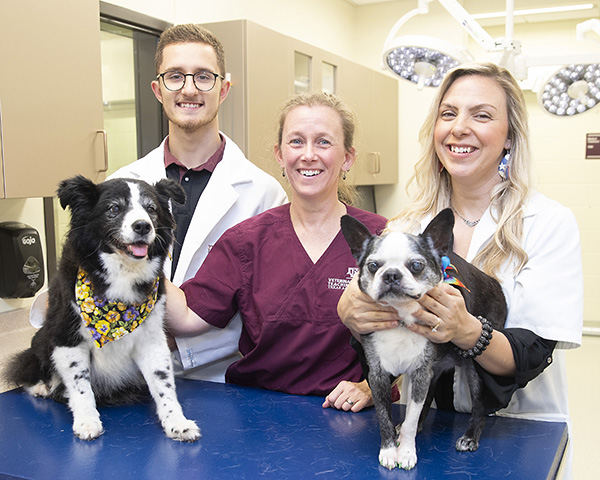Texas A&M, Washington team up for $23 million Dog Aging Project

Everyone who loves a dog wants the animal, whether pet or work companion, to enjoy as many years as possible. Learning the whys behind the length and strength of dogs’ lifespans has become the impetus for the largest research data-gathering program of its kind, the Dog Aging Project.
The $23 million initiative is jointly operated by the Texas A&M University College of Veterinary Medicine & Biomedical Sciences and the University of Washington School of Medicine. It will create a national community of dogs, owners, veterinarians, researchers and volunteers, all working together to advance knowledge about how genes, habits and the environment influence dog aging.
Although the project has been in its preliminary stages for a while, it was formally announced on Nov. 14 at the annual Gerontological Society of America meeting in Austin. Dog owners can nominate their canine as a candidate on the Dog Aging Project website.
Nomination involves creating a secure user portal and providing comprehensive health and lifestyle information about the dog through questionnaires and the sharing of veterinary medical records.
Dogs of every age, from puppy to senior; all sizes, from miniature to huge; male and female; neutered or not; and living in all types of locations are invited to be nominated. Healthy dogs and those with chronic illness will be considered.
“All owners who complete the nomination process will become Dog Aging Project citizen scientists and their dogs will become members of the Dog Aging Project ‘pack.’ Their information will allow us to begin carrying out important research on aging in dogs,” said one of the project’s trio of directors, biology of aging expert Daniel Promislow, professor of pathology at the UW School of Medicine and a professor of biology.
Also leading the multi-institutional project are veterinarian Kate Creevy, associate professor of veterinary internal medicine at Texas A&M, and longevity and healthspan researcher Matt Kaeberlein, a professor of pathology at the UW School of Medicine. More than 40 other researchers from a variety of fields and institutions will join them in this endeavor.
“Aging is the major cause of the most common diseases, like cancer and heart problems. Dogs age more rapidly than people do and get many of our same diseases of aging, including cognitive decline,” Kaeberlein said. “They also share our living environment and have a diverse genetic makeup. This project will contribute broadly to knowledge about aging in dogs and in people.”
Over the 10-year project, scientists will gather information on the 10,000 enrolled dogs in a collaborative, open-data platform. This means that, like the Framingham Heart Study and the All of Us research program, the massive amount of data can be analyzed by scientists around the world in a variety of ways. For this study, the largest of its kind ever undertaken, the dogs will be followed throughout their lifetimes.
“We are excited to work with companion dogs in this research program. As a veterinarian, it is important to me that our work benefits dogs directly. But our work with dogs has the added value of shedding light on the human aging experience as well,” Creevy said.

